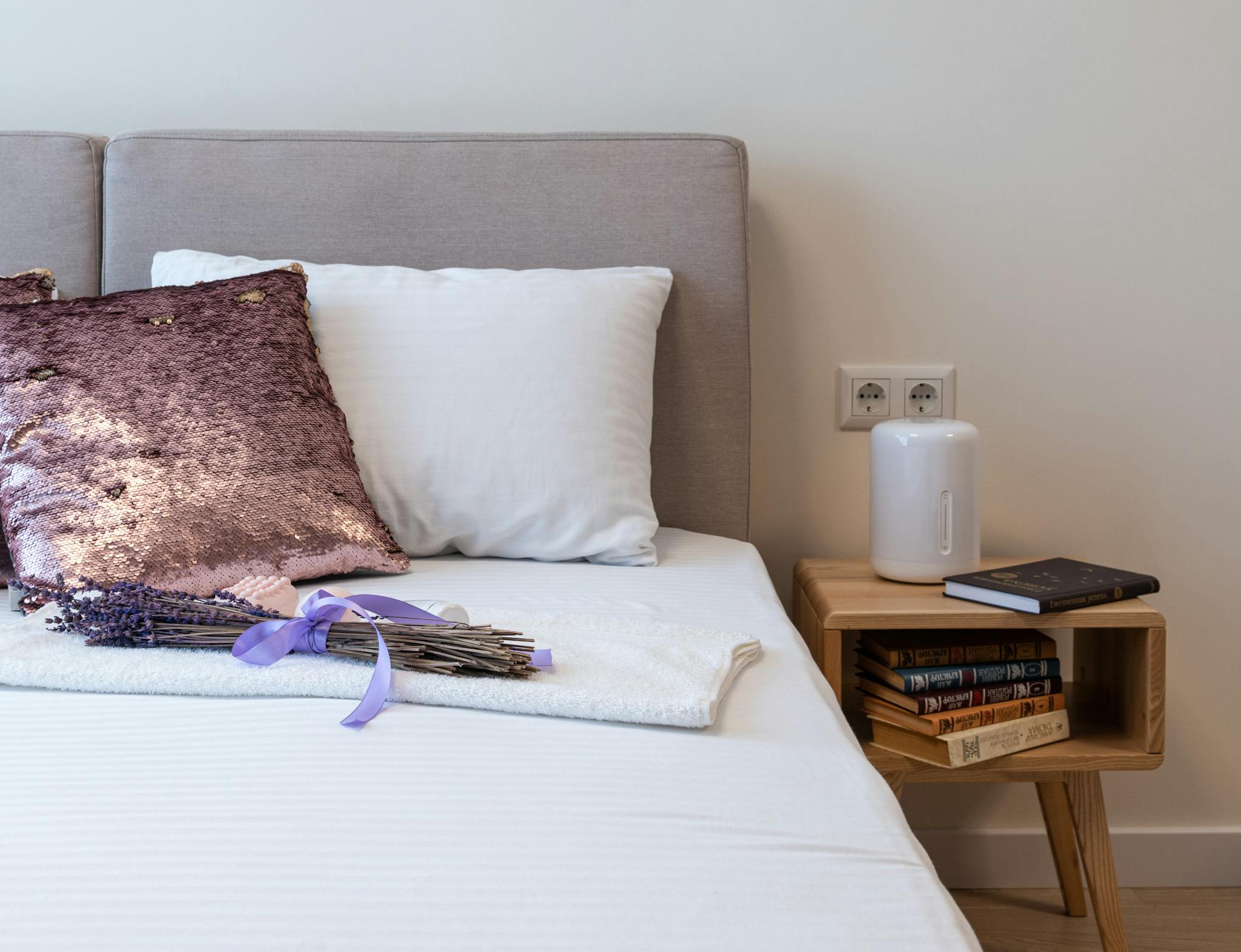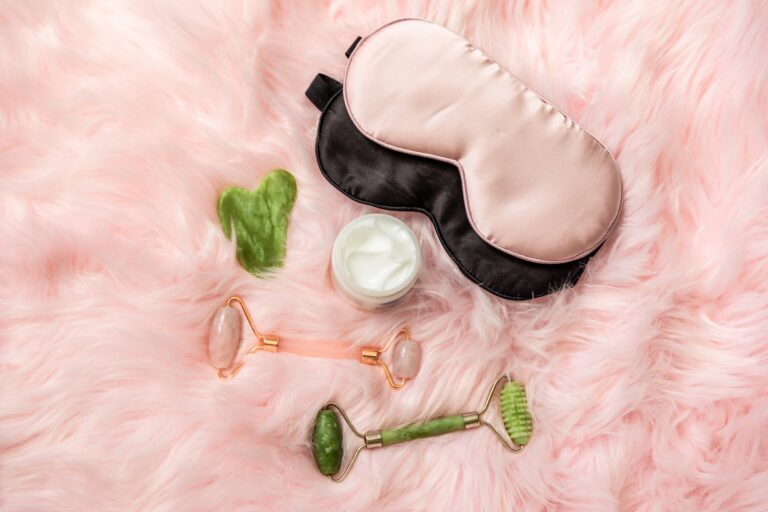Best Humidifier for Snoring: Top Picks to Improve Sleep Quality
There are some affiliate links below, but they are all products I highly recommend. For more info, view my disclosure here.
If you or your partner snore, you know how disruptive it can be to a good night’s sleep. Snoring occurs when the airway is partially blocked, causing vibrations in the throat. One way to alleviate snoring is by using a humidifier, which adds moisture to the air and can help reduce congestion in the nasal passages and throat.
When it comes to choosing the best humidifier for snoring, there are a few factors to consider. First, you’ll want to look for a humidifier that produces cool mist, as warm mist can actually make snoring worse by relaxing the throat muscles.
You’ll also want to consider the size of the humidifier, as well as its noise level, ease of use, and maintenance requirements. We’ll take a look at some of the top humidifiers on the market for snoring relief, so you can get a better night’s sleep.
Understanding Snoring and Its Causes
Snoring is a common problem that affects millions of people worldwide. It is caused by the partial obstruction of the airway during sleep, which leads to the vibration of the soft tissues in the throat. Snoring can be a nuisance for both the snorer and their sleeping partner, and it can also be a sign of underlying health issues.
Role of Dry Air in Snoring
Dry air is one of the major factors that contribute to snoring. When the air in your bedroom is dry, it can cause the nasal passages to become congested, which makes it harder to breathe through your nose. This can lead to mouth breathing, which increases the likelihood of snoring.
Using a humidifier can help alleviate snoring caused by dry air. By adding moisture to the air, a humidifier can keep the nasal passages moist and reduce congestion. This makes it easier to breathe through your nose and reduces the likelihood of snoring.
Effects of Humidity Levels on Nasal Passages
The humidity level in your bedroom can also have a significant impact on your nasal passages. If the air is too dry, it can cause the nasal passages to become inflamed and irritated, which can lead to snoring. On the other hand, if the air is too humid, it can make it harder to breathe and increase the likelihood of snoring.
To avoid these issues, it is important to maintain a healthy humidity level in your bedroom. The ideal humidity level for sleeping is between 30% and 50%. Using a humidifier can help you achieve this level of humidity and reduce the likelihood of snoring.
In conclusion, snoring is a common problem that can be caused by a variety of factors, including dry air and nasal congestion. Using a humidifier can help alleviate snoring caused by these issues and improve the quality of your sleep. By maintaining a healthy humidity level in your bedroom, you can reduce the likelihood of snoring and enjoy a peaceful night’s sleep.
Types of Humidifiers and Their Benefits
Humidifiers are classified into different types based on their operating mechanisms. Each type of humidifier has its unique benefits. Here we will discuss the most common types of humidifiers and their advantages.
Warm Mist vs. Cool Mist Humidifiers
Warm mist humidifiers produce warm mist by heating water before releasing it into the air. They are quieter and produce less white dust than cool mist humidifiers. Warm mist humidifiers are ideal for bedrooms as they provide a cozy and comfortable environment.
On the other hand, cool mist humidifiers release cool mist into the air. They are energy-efficient and consume less power than warm mist humidifiers. Cool mist humidifiers are ideal for larger rooms and can help alleviate allergy and asthma symptoms.
Ultrasonic vs. Evaporative Humidifiers
Ultrasonic humidifiers use high-frequency vibrations to produce a fine mist that is released into the air. They are energy-efficient and operate quietly. Ultrasonic humidifiers are ideal for bedrooms and nurseries as they do not disturb sleep.
Evaporative humidifiers use a fan to blow air through a wet wick or filter, which causes water to evaporate and humidify the air. They are cost-effective and require less maintenance than other types of humidifiers. Evaporative humidifiers are ideal for larger rooms and can help alleviate dry skin and respiratory problems.
In summary, warm mist humidifiers are ideal for bedrooms, while cool mist humidifiers are ideal for larger rooms. Ultrasonic humidifiers are energy-efficient and operate quietly, while evaporative humidifiers are cost-effective and require less maintenance. Choose the type of humidifier that best suits your needs and enjoy the benefits of clean and comfortable air.
Features to Consider When Choosing a Humidifier
If you are looking for a humidifier to help alleviate snoring, there are several features to consider before making a purchase. Here are some important factors to keep in mind:
Humidifier Capacity and Room Size
One of the most important factors to consider when choosing a humidifier is the capacity of the machine and the size of the room you plan to use it in. If you have a large room, you will need a humidifier with a larger capacity to effectively humidify the air. Look for models that specify the square footage they can cover to ensure that you get the right size for your needs.
Ease of Use and Maintenance
Humidifiers should be easy to use and maintain. Look for models with simple controls and easy-to-clean components. Some models come with a remote control, which can be convenient if you want to adjust the settings without getting out of bed. Additionally, consider how easy it is to refill the water tank and monitor the water level.
Additional Features: Essential Oils and Noise Level
Some humidifiers come with additional features that can enhance your experience. If you enjoy using essential oils, look for models that have an essential oil diffuser built-in. This can help you relax and sleep better at night. Additionally, consider the noise level of the humidifier. If you are a light sleeper, you may want to look for a model that operates quietly so as not to disturb your sleep.
By considering these factors, you can choose a humidifier that is right for your needs and can help alleviate snoring.
Health Benefits of Using a Humidifier
If you’re a snorer, using a humidifier can help you get a better night’s sleep. But, did you know that using a humidifier can also have other health benefits? In this section, we’ll explore some of the health benefits of using a humidifier.
Alleviating Dry Skin and Throat Irritations
Dry air can cause skin irritation, especially during the winter months. Using a humidifier can add moisture to the air, which can help alleviate dry skin and prevent irritation. Additionally, if you suffer from a dry or sore throat, using a humidifier can help soothe your throat and prevent further irritation.
Preventing Respiratory and Health Problems
Dry air can also cause respiratory problems, especially for those with allergies or asthma. Using a humidifier can help maintain moisture levels in the air, which can prevent respiratory problems and improve overall health. Additionally, using a humidifier can help prevent the spread of airborne viruses and bacteria, which can cause illnesses such as the flu.
In summary, using a humidifier can provide numerous health benefits, including alleviating dry skin and throat irritations, and preventing respiratory and health problems. If you’re considering purchasing a humidifier, be sure to choose one that is appropriate for your needs and follow the manufacturer’s instructions for use and maintenance.
Best Humidifiers for Snorers: Top Picks
If you’re a snorer, you know how disruptive it can be to your own sleep and that of your partner. Humidifiers can help alleviate snoring by adding moisture to the air, reducing congestion and irritation in the nasal passages, and promoting better breathing. Here are our top picks for the best humidifiers for snorers.
Humidifiers for Large Spaces
If you’re looking for a humidifier that can cover a larger space, the Levoit Humidifier is a great choice. It has a large 6-liter capacity and can cover up to 750 square feet of space, making it perfect for bedrooms or living rooms. It also has a built-in humidistat that can maintain a desired humidity level, and a remote control for convenient operation. The Levoit Humidifier also has a sleek, modern design that will blend in well with any decor.
Compact Designs for Small Spaces
For smaller spaces such as offices or bedrooms, a compact humidifier is a great option. The Best Choice Products Ultrasonic Cool Mist Humidifier is our top pick for small spaces. It has a 1.3-liter capacity and can cover up to 350 square feet of space. It also has a quiet operation and an auto shut-off feature for safety. The Best Choice Products Ultrasonic Cool Mist Humidifier also has a sleek, modern design that will fit in well with any decor.
Overall, the Levoit Humidifier and the Best Choice Products Ultrasonic Cool Mist Humidifier are the best options for snorers. They both have great features and are highly effective at reducing snoring. Whichever one you choose, you can rest easy knowing that you’re taking steps to improve your sleep and reduce snoring.
Humidifier Use in Different Climates and Seasons
Humidifiers are a great addition to your bedroom, especially if you snore. They add moisture to the air and can help reduce snoring caused by dry air. However, the way you use your humidifier may need to change depending on the climate and season you are in.
Adapting to the Winter and Colder Months
During the winter months and in colder climates, the air is naturally drier. This is because cold air holds less moisture than warm air. As a result, you may need to use your humidifier more often and at a higher setting to achieve the same level of humidity as in the summer.
It is important to maintain a consistent humidity level in your bedroom throughout the night. You can use a hygrometer to measure the humidity level and adjust your humidifier accordingly. It is also important to clean your humidifier regularly to prevent the growth of mold and bacteria.
Adjustments for Summer and Warmer Climates
In the summer months and in warmer climates, the air is naturally more humid. As a result, you may not need to use your humidifier as often or at as high of a setting as in the winter. However, if you live in a dry climate, you may still need to use your humidifier year-round.
It is important to remember that too much humidity can also be harmful. High humidity levels can promote the growth of mold and bacteria, which can worsen allergies and asthma. It is recommended to keep the humidity level between 30-50%.
In summary, using a humidifier can be beneficial for reducing snoring, but it is important to adjust your usage based on the climate and season. Regular cleaning and maintenance is also crucial for safe and effective use.
Maintenance and Care for Optimal Performance
Humidifiers are an excellent option for those who suffer from snoring. However, to ensure that your humidifier is working optimally, it is important to perform regular maintenance and care. Here are some tips to keep your humidifier in top shape.
Cleaning and Replacing Filters
The filter is an essential component of your humidifier that helps to remove impurities from the water before it is dispersed into the air. Over time, the filter can become clogged with mineral deposits, which can affect the performance of your humidifier. It is important to clean or replace your filter regularly to ensure that your humidifier is working efficiently.
If you are using a wick filter, it is recommended that you replace it every 1-2 months. To clean your filter, simply remove it from the humidifier and rinse it under running water. Be sure to let it dry completely before placing it back into the humidifier.
Water Quality and Humidifier Longevity
The quality of the water you use in your humidifier can impact its longevity. Using distilled water is the best option as it is free from minerals and impurities that can build up in your humidifier over time. If you are using tap water, it is important to note that it may contain minerals that can cause buildup and affect the performance of your humidifier.
To prevent mineral buildup, it is recommended that you use a demineralization cartridge or add a small amount of vinegar to the water when filling your humidifier. This will help to break down any mineral deposits and keep your humidifier working efficiently.
In addition to cleaning your humidifier and using distilled water, it is important to follow good housekeeping practices. This includes emptying and cleaning your humidifier regularly, especially if you are not using it for an extended period of time. By following these tips, you can ensure that your humidifier is working optimally and providing relief from snoring.
Additional Considerations for Snoring Relief
When it comes to reducing snoring, a humidifier can be a great addition to your arsenal of solutions. However, there are a few additional considerations to keep in mind to ensure you get the most out of your humidifier.
Integrating Humidifiers with Other Snoring Solutions
While a humidifier can be effective on its own, it can also be used in conjunction with other snoring solutions for even better results. For example, if you suffer from obstructive sleep apnea, a CPAP humidifier can help keep your airways moist and reduce snoring. Additionally, using a humidifier in combination with positional therapy, such as sleeping on your side, can further decrease snoring.
It’s important to note that while using a humidifier with other snoring solutions can be a good idea, it ultimately comes down to personal preference. Some people may find that a humidifier alone is enough to alleviate their snoring, while others may need to combine it with other solutions.
When choosing a humidifier for snoring relief, it’s important to consider the size of your room and the type of humidifier that will work best for you. A cool mist humidifier is a good option for those with allergies or asthma, while a warm mist humidifier can be more soothing for those with dry nasal passages.
Overall, a humidifier can be a helpful addition to your snoring relief routine. By integrating it with other solutions and choosing the right type for your needs, you can enjoy a more restful night’s sleep.






